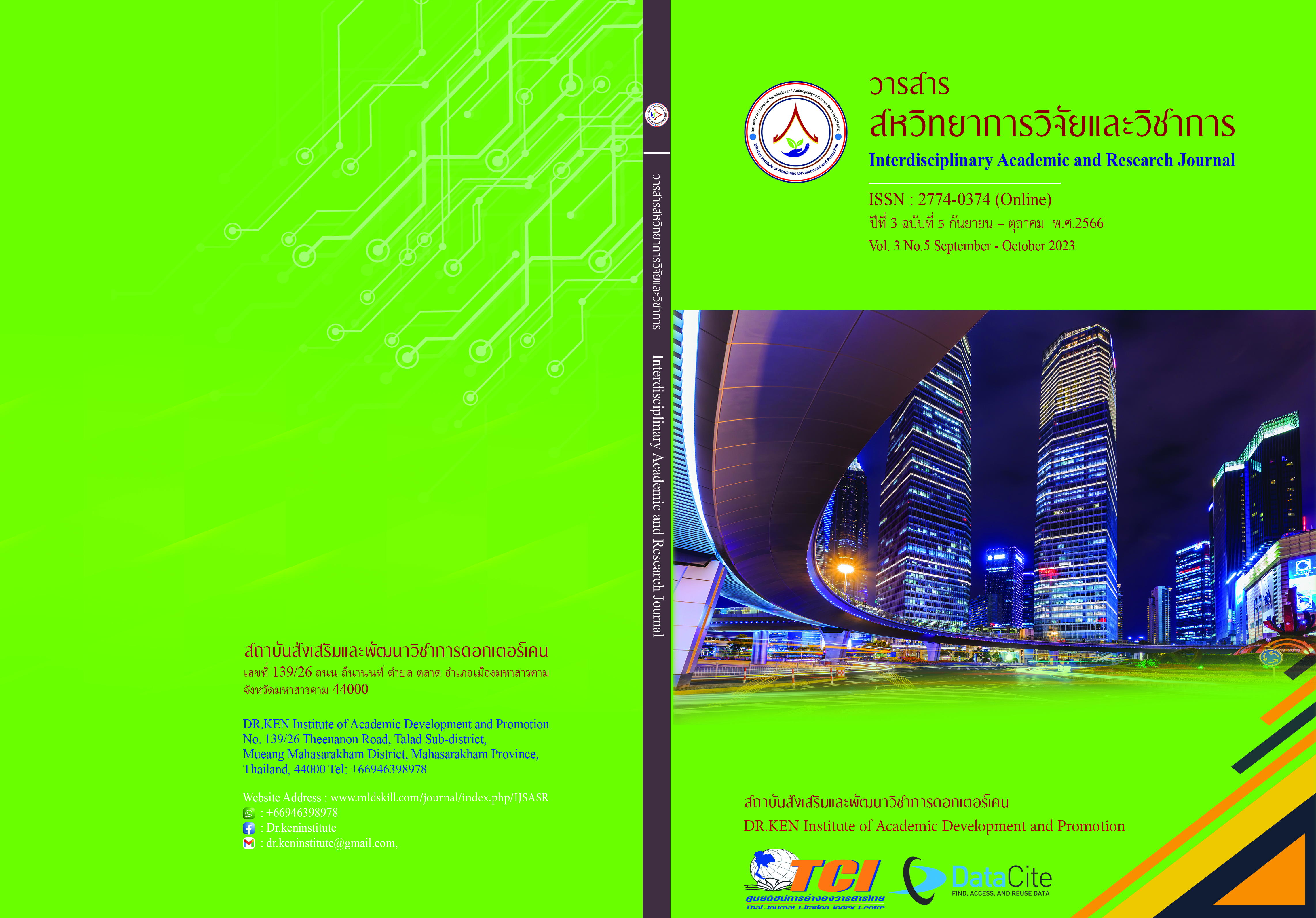Motivation Development as Related to Work Performance for Staff in Faculty of Pharmacy, Mahasarakham University
DOI:
https://doi.org/10.14456/iarj.2023.291Keywords:
Support Personnel; , Office; , Secretary; , FacultyAbstract
Having personnel with expertise and understanding of the activities that the person in charge is like a valuable resource of the organization that will lead the organization's operations towards the goals set to drive the organization to be able to operate. Go efficiently and be able to compete with competitors. The organization, therefore, needs to maintain personnel to commit to the organization and be a member of the organization as long as possible. Therefore, enhancing and developing employee motivation to be more efficient and effective is essential to the organization. The purpose of this research is; (1) To study opinions about work motivation factors affecting organizational engagement of support personnel. (2) To study the job satisfaction of support personnel. (3) To study the work motivation of support personnel. And (4) To study methods for enhancing and developing the work motivation of support personnel. The sample group used in this study was 20 supporting personnel of the Secretariat Office, Faculty of Pharmacy, Mahasarakham University. The tool used to collect data is a questionnaire. The quantitative data were analyzed using basic statistics such as percentage, mean, and standard deviation, The qualitative data were analyzed using Content Analysis and presented descriptively. The results showed that; (1) Work motivation factors affecting organizational engagement of supporting personnel as a whole were at a high level. (2) Job satisfaction of support personnel was at a high level. (3) Work motivation of support personnel was at a high level. And (4) Guidelines for enhancing and developing work motivation of supporting personnel include; creating a supportive corporate culture, setting clear goals and rewards, creating spaces and career development opportunities, creating open communication, creating understanding and accountability, growth support, creating a pleasant working atmosphere, Fair consideration and evaluation, and enhancing confidence and confidence.
References
ชวัลณัฐ เหล่าพูนพัฒน์. (2548). ปัจจัยส่งผลต่อความผูกพันต่อองค์การ โดยมีความพึงพอใจในงานเป็นตัวแปร. สื่อวิทยนิพนธ์มหาบัณฑิต สาขาจิตวิทยาอุสาหกรรมและองค์การ คณะศิลปศาสตร์. มหาวิทยาลัย,
ณัฐวรุณ เทศงามถ้วน (2563). แรงจูงใจในงานและวัฒนธรรมองค์กรที่มีผลต่อความคงอยู่ในงานของข้าราชการ สังกัดโรงพยาบาลตากสิน กรุงเทพมหานคร. สารนิพนธ์หลักสูตรบริหารธุรกิจมหาบัณฑิต สาขาวิชาการจัดการ คณะบริหารธุรกิจเพื่อสังคม มหาวิทยาลัยศรีนครินทรวิโรฒ
ดรุณศรี สิริยศธำรง. (2542) คุณภาพชีวิตการทำงานกับความยึดมั่นต่อองค์การของพยาบาลห้องผ่าตัดโรงพยาบาลศูนย์. เชียงใหม่: มหาวิทยาลัยเชียงใหม่.
บุญชม ศรีสะอาด. (2545). การวิจัยเบื้องต้น. พิมพ์ครั้งที่ 7. กรุงเทพฯ: สุวีริยสาสน์.
รัศมี เอกณรงค์. (2556). แรงจูงใจในการทำงานและพึงพอใจที่มีความสัมพันธ์กับความผูกพันต่อองค์กรของพนักงาน. มหาวิทยาลัยศรีนครินทรวิโรฒ,
วรัชฐนันป์ เครือวรรณ (2563).ความสัมพันธ์ระหว่างจรรยาบรรณวิชาชีพกับคุณภาพการทำงานของพนักงาน สายสนับสนุนในมหาวิทยาลัยมหาสารคาม.วารสารการบัญชีและการจัดการ มหาวิทยาลัยมหาสารคาม. 12 (1), 66-76.
ศิริกันยา ลลิตวสุภิญโญ (2562). แนวทางการพัฒนาแรงจูงใจในการทำงานที่ส่งผลต่อความผูกพันของพนักงานมหาวิทยาลัย สายสนับสนุน มหาวิทยาลัยราชภัฏในกลุ่มภูมิภาคตะวันตก. งานประชุมวิชาการระดับชาติครั้งที่ 11 มหาวิทยาลัยราชภัฏนครปฐม มหาวิทยาลัยราชภัฏนครปฐม, จังหวัดนครปฐม 11 – 12 กรกฎาคม 2562
สุวนีย์ ฤทธิ์ถาพรม. (2555). การศึกษาแรงจูงใจในการปฏิบัติงานของครูในโรงเรียน สังกัดองค์การบริหารส่วนจังหวัดมหาสารคาม. (วิทยานิพนธ์ครุศาสตรมหาบัณฑิต). มหาสารคาม: มหาวิทยาลัยราชภัฏมหาสารคาม.
อัจจรา อัจฉริยะอุสาห์. (2554). ความพึงพอใจในการทำงานกับการออกจากงานของพนักงานธนาคารพาณิชย์แห่งหนึ่ง. มหาวิทยาลัยธรรมศาสตร์.
Allen, N.J. & Meyer, J.P. (1997). Commitment in the workplace. California: Sage Publications.
Herzberg, F. (1959). Two Factor Theory Organizational Behavior. New York: Wiley & Sons.
Normala, D. (2010). Investigating the relationship between quality of work life and organizational commitment amongst employees in Malaysian firms. International journal of business and management, 5(10), 75-82. DOI:10.5539/ijbm.v5n10p75
Rhoades, L., & Eisenberger, R. (2002). Perceived organizational support: a review of the literature. Journal of Applied Psychology, 87(4), 698–714. https://doi.org/10.1037/0021-9010.87.4.698
Sohail, A., Safdar, R., Saleem, S., Ansar, S., & Azeem, M.U. (2014). Effect of Work Motivation and Organizational Commitment on Job Satisfaction: (A Case of Education Industry in Pakistan). Global Journal of Management and Business Research, 14 (6), 1-7.
Suma, S., & Lesh, J. (2013) Job Satisfaction and Organizational Commitment: The Case of Shkodra Municipality. European Scientific Journal, 9, 41-52.
Tella, A., Ayeni, O. and Popoola, S. (2007). Work Motivation, Job Satisfaction, and Organisational Commitment of Library Personnel in Academic and Research Libraries in Oyo State, Nigeria. Library Philosophy and Practice (E-Journal), 9. http://digitalcommons.unl.edu/libphilprac/118
Tentama, P. (2016). The Roles of Teachers' Work Motivation and Teachers' Job Satisfaction in the Organizational Commitment in Extraordinary Schools. International Journal of Evaluation and Research in Education (IJERE), March 2016
DOI: 10.11591/ijere.v5i1.4520
Downloads
Published
How to Cite
Issue
Section
License
Copyright (c) 2023 Punchapha Samanchit

This work is licensed under a Creative Commons Attribution-NonCommercial-NoDerivatives 4.0 International License.
Copyright on any article in the Interdisciplinary Academic and Research Journal is retained by the author(s) under the under the Creative Commons Attribution-NonCommercial-NoDerivatives 4.0 International License. Permission to use text, content, images, etc. of publication. Any user to read, download, copy, distribute, print, search, or link to the full texts of articles, crawl them for indexing, pass them as data to software, or use them for any other lawful purpose. But do not use it for commercial use or with the intent to benefit any business.
















.png)


